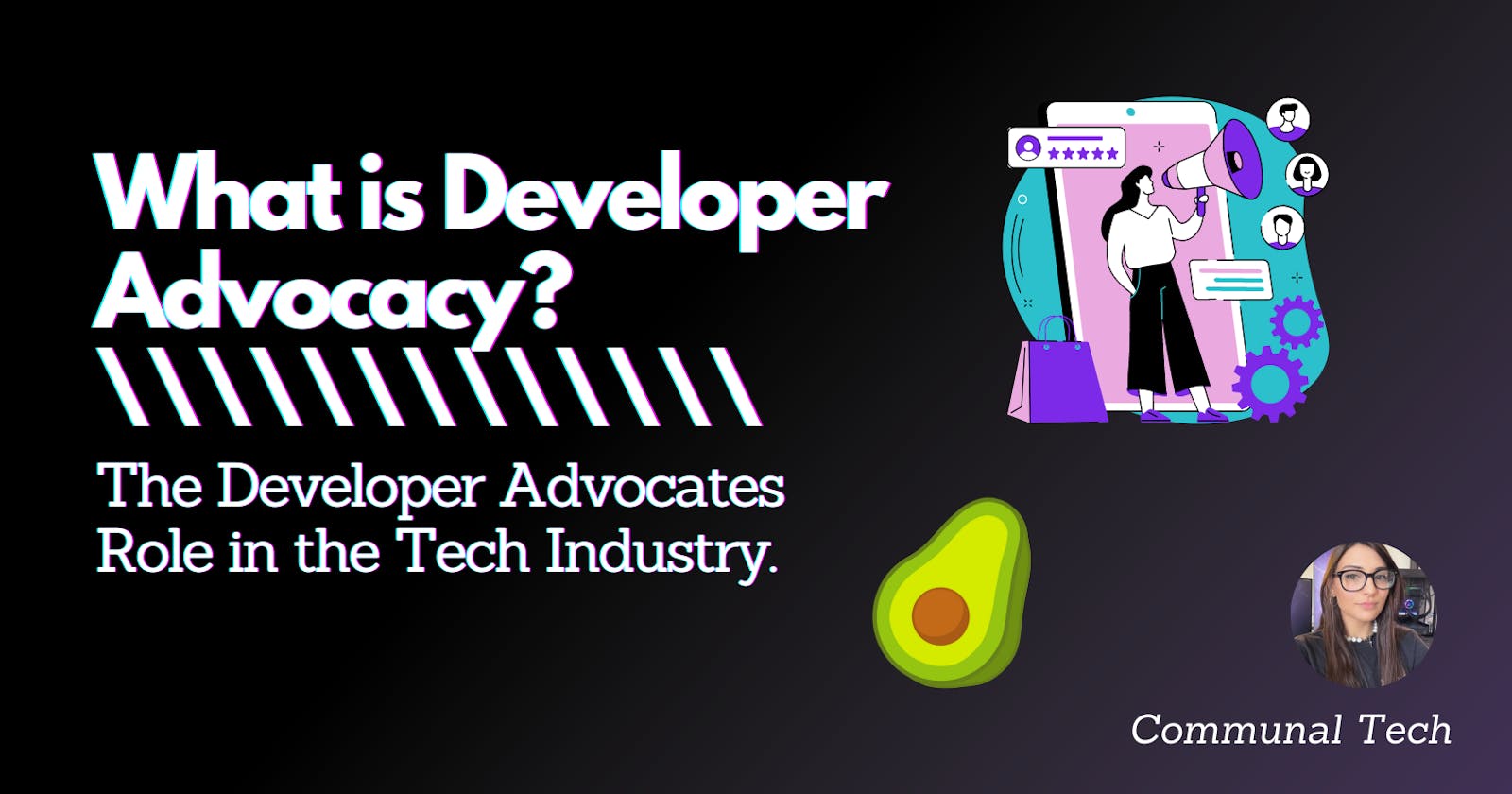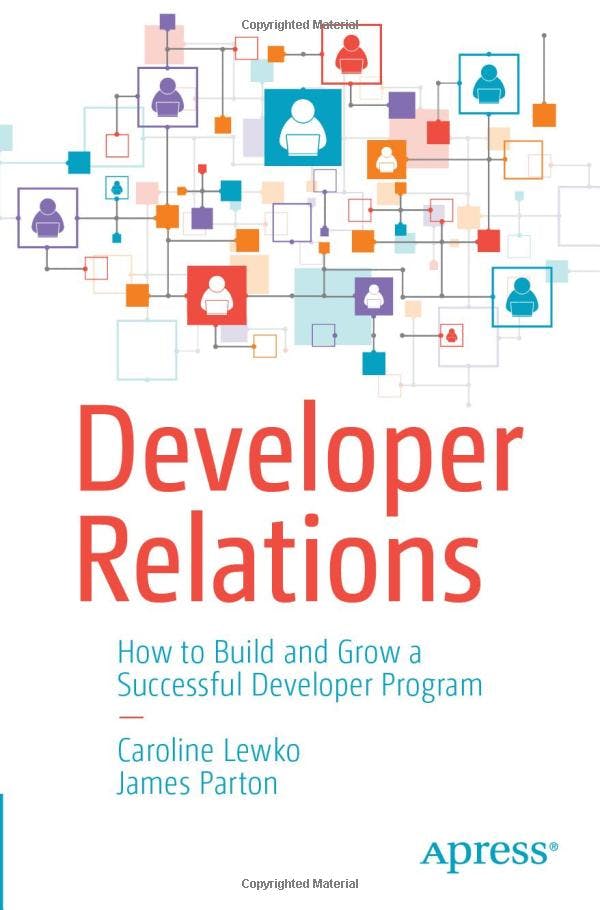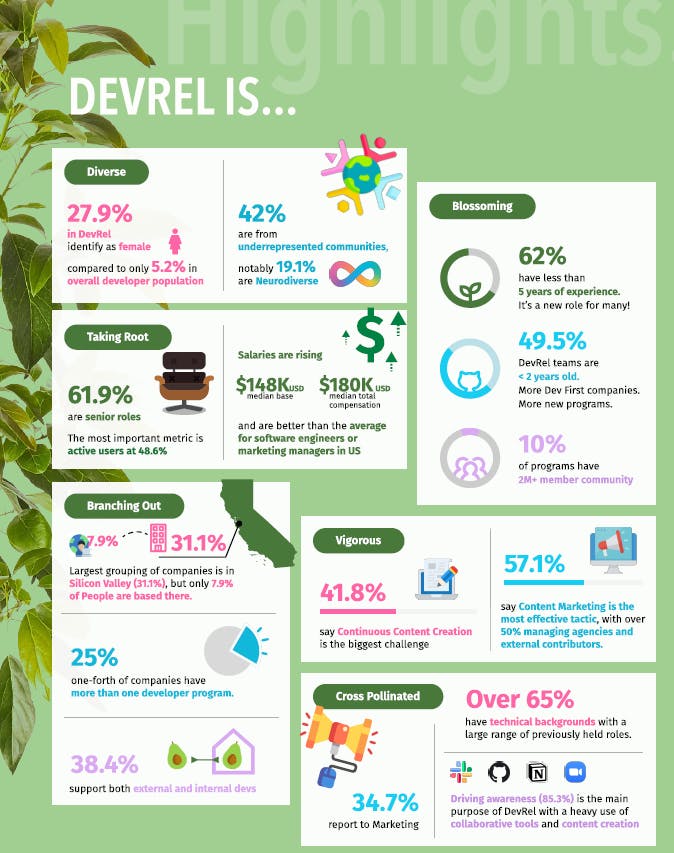What is Developer Advocacy? 🥑
The Developer Advocate's Role in the Tech Industry
What is Developer Advocacy?
Imagine a typical tech startup: the engineering department, marketing department, business development, product, design, and so on. This tech startup may require all employees to have some technical expertise, but are all employees highly proficient in software engineering? Absolutely not, that would be unsustainable. It's unreasonable to require all departments to be as technically proficient as the engineers. This is where developer advocates come into play.
Developer advocates play a vital role in the tech industry by acting as a liaison between developers, and everyone else.
Internally, developer advocates represent engineers in their company.
Externally, developer advocates represent engineers in the community.
Major tech giants, like Apple and Microsoft, realize the immense value of talented developer communicators and influential developer communities. By employing dedicated developer advocates, companies boost their productivity without distracting their dedicated software engineers. As interdepartmental communicators, dev advocates provide key insight from engineers to the rest of the company in terms that everyone can understand. As the face of the company, developer advocates act as a key channel to the developer community. Overall, developer advocates are vital representatives on behalf of developers.
Developer Advocacy vs. Developer Relations
It's important to distinguish that developer advocacy roles are not always called "developer advocates." Developer advocacy is often interchangeable between developer relations, developer evangelism, developer marketing, and developer experience roles. While these roles have slight differences, their differences are highly debated and not universal, so this blog post won't go into that. What's important to know is that if you are seeking a career in developer advocacy, many other roles may overlap but may not be called "developer advocate" roles.
If you're curious to learn more about developer relations and other similar roles, I highly recommend reading "Developer Relations: How To Build and Grow a Successful Developer Relations Program" by Caroline Lewko and James Parton (pictured below). This book provides an outstanding starting point for the devrel curious and aspiring developer advocates!
Developer Advocate Job Duties
The developer advocate has a wider scope than most departments, with duties ranging from engineering to marketing.
Typical developer advocate tasks include:
conducting technical demonstrations
creating consistent technical content
managing developer programs and initiatives
live representation at conferences
writing blog posts and technical documentation
testing products and gap analysis
building community feedback loops and commitment pipelines
troubleshooting with users
educating developers
working with partnerships and integrations
acting as a developer decision maker
organizing events and meetups
building brand awareness
Developer advocates may focus on one particular task, or wear many hats, depending on the needs of the company. They may even work independently as contractors-for-hire, such as I did early in my tech career with Communal Tech.
Do developer advocates code?
Yes, just not as regularly as engineers. When your target audience is programmers, you're required to stay updated on the latest technological developments and demonstrate your technical expertise.
However, dev advocates may code just as regularly as software engineers, just no on production-level projects. For example, Angie Jones, Senior Director of Developer Relations at Applitools, states in the article "The Vital Role of Developer Advocates in Engineering Communities" by Cathy Reisenwitz that she does "more coding as a developer advocate than she did in her traditional engineering roles."
"For example, five different programming languages support Applitools’ API, which integrates with more than 50 different test libraries. This gives me quite a bit to learn in order to speak and teach to these various sub-communities within tech. But how amazing is that?! I’m not tied down to a specific tech stack like I would be in a traditional engineering role. Instead I am able to explore and learn new languages and frameworks."
- Angie Jones, Senior Director of Developer Relations at Applitools
In sum, developer advocates are software engineers, but their job puts equal emphasis on communication as it does on code, and they do not contribute to production-level code as often.
The Rise of Dev Advocates in the Tech Industry
The rise of developer advocacy began in the 1980s when advertisers at Apple realized developers could not be targeted with traditional advertising. Through extensive user research, developer marketing was born, which determined specific principles marketers should follow if they are targetting developers. Logic, straightforwardness, and practicality were among those values, as user researchers determined developers required advertisers to speak their language to get through to them, not use flowery language as you see with traditional advertising.
“Developers sniff out anything that smells like marketing. They are a tough audience, because they’ll ridicule you if they sense inauthentic motives. Even when you have good intentions, you can come across otherwise.”
- Adam DuVander, author of "Developer Marketing Does Not Exist"
With the rise of developer marketing, there was an increased need for representatives who could act as liaisons between developer communities and the company. In 1982, Apple was the first to coin the term "Developer Evangelist" and "Developer Relations" as official roles and started the first recognized developer relations program by the late 1980s. By the early 1990s, tech giants such as Microsoft and Intel adopted their own developer relations programs, followed by Salesforce, eBay, and Cisco by the early 2000s.
The first developer relations programs primarily focused on developer education and technical community management. For instance, as many tech companies began launching their APIs in the early 2000s, the need for proficient experts to lead API developers skyrocketed. Companies such as GitHub, Stack Overflow, Hacker News, and Tech Crunch grew during this time, increasing the value of communities for developers. It became evident that there was immense value in developer communities for both companies and individuals. As a company could increase its share of the tech talent market, individual developers could benefit from being well-recognized in their community, enabling them to network into career opportunities.
By the late 2010s, social media had dominated the internet and the modern developer advocate began utilizing technical content creation to engage with developers. Developer advocates may manage social media on social networks such as LinkedIn and Twitter, while also managing communities on GitHub and Stack Overflow. Additionally, as the tech industry continues to grapple with issues of diversity and representation, developer advocates became responsible for creating more inclusive communities.
Succeeding as a Developer Advocate
The best developer advocates are proficient in both software engineering and communication. While some traits of a great developer advocate can be learned, I also believe that certain characteristics must be innate. Altruism comes with being a great educator, empathy comes with being a skilled communicator, and altruism and empathy must come naturally to an extent. If you feel that these traits suit you, then a career in developer advocacy may be an excellent fit!
Getting Started as a Developer Advocate
There is no defined path to becoming a developer advocate, but there are strategies you can execute to work toward your developer advocacy goals. Unlike most niche career paths in tech, developer advocacy is flexible and can be adapted to all stacks and technologies. You can become a distinguished developer advocate for a certain tech stack such as Vera Tiago, Lead Developer Advocate at OutSystems and Christian Hernandez, GitOps Developer Advocate at Red Hat, or be a generalist for hire, such as a tech influencer.
Additionally, developer advocacy is adaptable to your proficiency level. Many developer advocacy jobs are suitable for junior developers and are excellent opportunities to work adjacent to seniors. While senior developers can turn to developer advocacy to pass on their knowledge as educators and try out new, fulfilling career paths.
Power Moves for New Developer Advocates
If you wish to become a Developer Advocate, I recommend focusing on building a portfolio that demonstrates your technical communication abilities and interests in developer communities.
Proven strategies for standing out as an aspiring developer advocate:
creating technical content, such as YouTube videos, podcast episodes, and blog posts
volunteering to educate junior developers
engaging & leading in developer meet-ups or virtual communities
contributing to open-source projects
building side projects that are helpful for real-world developers, like AutoRegex or a Notion Dashboard for example
Developer Advocate Job Trends
Generally, developer advocacy is a rapidly growing field in the tech industry, and job opportunities for developer advocates are on the rise. While growth may be stalled due to the recent 2023 market downturn, developer advocacy's job outlook remains relatively positive as reflective of the greater tech industry.
The Annual State of DevRel survey (pictured below) notes that the developer advocacy industry is becoming increasingly more diverse, compensation is rising, and there is a higher demand for senior roles than senior developer advocates available.
Notably, there is a documented shift towards a social media-integrated approach to developer advocacy. This shift means that developer advocates must have an increasingly broader range of skills, including not only technical expertise but also strong content creation talent.
Interested in applying to Developer Relations and Developer Advocacy Jobs? In addition to general job sites, be sure to check out DeveloperRelations.com Jobs and DevRel X Jobs!



